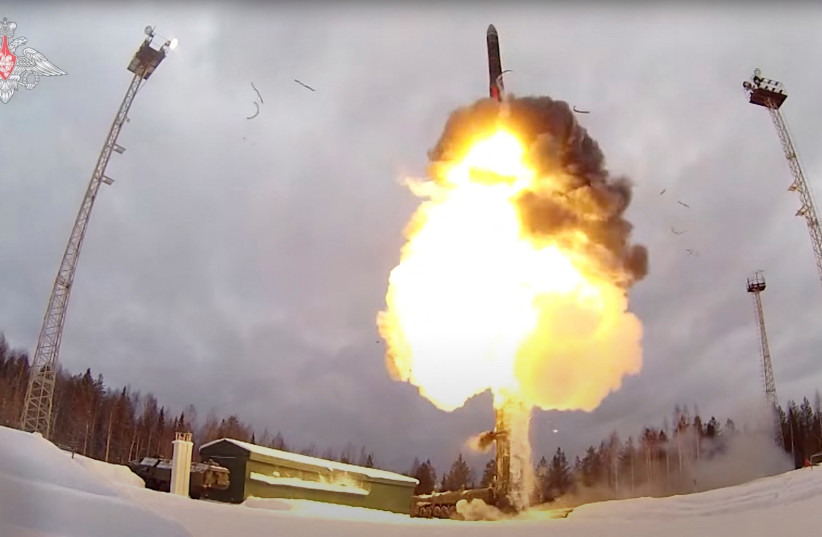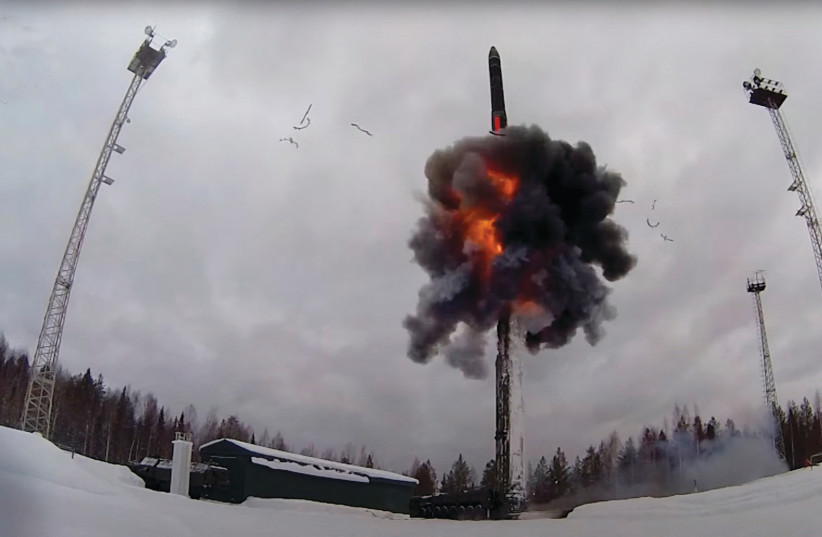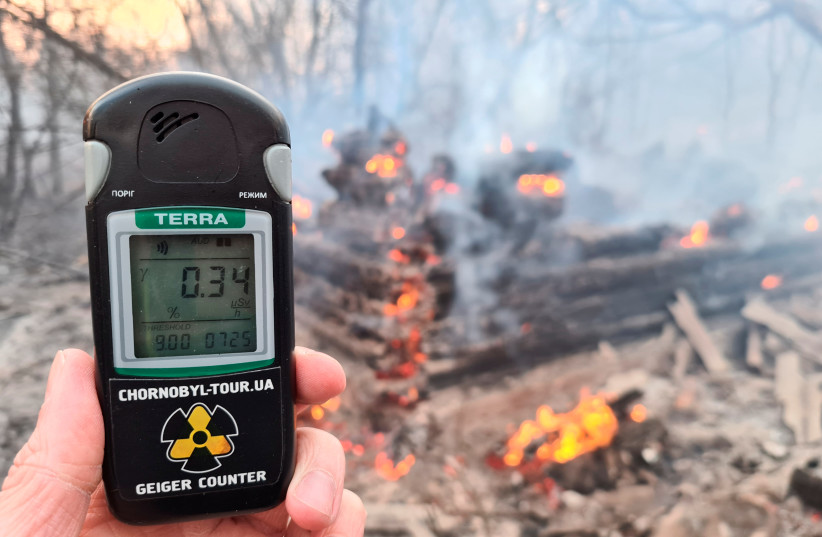World leaders have warned that the Russian invasion of Ukraine could spark a nuclear war, raising the question of how close the world now is to such a catastrophe.
“Our imagination appears increasingly concentrated on the representation of a final catastrophe that will extinguish us,” Pope Francis said this week in Rome.
“Nuclear conflict, once unthinkable, is now back within the realm of possibility,” UN Secretary-General Antonio Guterres told reporters in New York.
Russian President Vladimir Putin introduced the prospect by placing his country’s nuclear forces on high alert at the start of the war last month, warning the West of “catastrophic consequences” if it intervened in his “special military operation” in Ukraine.
Although US President Joe Biden has said a nuclear war is unlikely, fears that Putin might actually order a nuclear strike against a Western country has moderated western responses to the conflict.

This includes denying Ukraine a no-fly-zone demanded by President Volodymyr Zelensky in his address to Congress on Wednesday.
Ukraine relinquished its Soviet era nuclear weapon stockpile in 1994. Only the Kremlin or other nuclear powers such as France, the United Kingdom and the United States have the ability to escalate the war to a nuclear level.
William Alberque, director of Strategy, Technology, and Arms Control at the London-based International Institute for Strategic Studies (IISS) dismissed the possibility that the West would move first on nuclear weapons.
“I see no introduction of nuclear weapons by the West is even possible at this phase at all... For nuclear weapons to be used first in this crisis the only possible pathway is for Russia to introduce them,” Alberque said.
Such a scenario is most likely if an accidental battlefield escalation brings in NATO. In that situation one of the parties, most likely Russia, could cross the nuclear red line. This could include an incident along the Ukrainian-Polish border or if there was a no-fly-zone enforced by NATO, he said.

Pavel Podvig, a senior researcher at the Geneva-based UN Institute for Disarmament Research said the chance that Russia will use nuclear weapons is very low as long as the conflict is confined to its forces and Ukraine.
“It is very difficult to imagine that Russia would just start using nuclear weapons...they have no “military utility” in this situation, Podvig explained.
Moscow’s military doctrine itself limits the use of nuclear weapons to cases of aggression against Russia and there is no war on Russian territory, Podvig said. He did, however note, that the Kremlin could have a broad interpretation of what such aggression might constitute.
The chances for a nuclear strike increase, “if there is a direct conflict that would involve North Atlantic Treaty Organization and or the United States,” Podvig said.
NATO’s 30 members include nuclear powers such as the US, France and Great Britain as well as countries that border Ukraine such as Poland.

Russia is explicitly using its nuclear weapons to support its aggression against Ukraine, Podvig said. The fact that it has these weapons has hampered Western military support for Ukraine, he said. “
“This is kind of the worst of all worlds. We see that nuclear weapons enable the aggression on one hand. On the other hand, we see how nuclear weapons from the US and NATO, do not protect their allies” such as Ukraine, Podvig said.
Even NATO members on Ukraine’s border are nervous that the Alliance might not have their back, Podvig added.
Alberque said that Putin is the kind of leader who uses high risk scenarios, such as the threat of nuclear war, to his advantage.
Putin “revels in utilizing risks to try and control behavior. He has a much higher appetite for risk than most Western leaders. He is willing to do and say things” other might not, Alberque said.
If the Western public fears a nuclear war and or a military intervention, that gives him maximum leverage, Alberque stated.
It’s called “reflexive control. If you have all the options on the table” then the thought is, “how can I convince you to take the options that hurts me the most off the table.”
However, Alberque said Putin “knows that crossing the nuclear threshold means putting the regime at risk, which is something he does not want.”
The danger comes, Alberque warned, from the prospect of a Russian military defeat in Ukraine. That increases the chance that Putin might take a limited step in the direction of nuclear exchange by way of raising the fear level, Alberque said.
This could include detonating a nuclear device in the atmosphere, perhaps over the Black Sea. It would not kill people, but would underscore the reality of a nuclear threat, Alberque explained.
John Erath, Senior Policy Director for the Washington-based Center for Arms Control and Non-Proliferation said that Putin was already engaging in a game of nuclear brinkmanship, made more dangerous by his losses to date.
“Putin is not going to do things that will provoke nuclear war, but at the same time he knows that the other people involved are rational actors and want to avoid nuclear war, so he is going to try to push every button he can,” Erath said.
But the “Russian war plan has not gone according to script. Putin expected that he could knock on the door of Ukraine and the house would fall down.”
He imagined that he would easily replace the Ukrainian government with a puppet one that a served Moscow’s interests, Erath said.
The losses have led to a “dangerous calculus. You have the issue of the sunk costs mentality where all of this trouble and expense and blood has been put into Ukraine” without results, thereby increasing the possibility of extreme steps once thought unthinkable, he said.
“Any time there is a nuclear power involved in a conflict the danger is there and the more nuclear powers, the more nuclear weapons, the greater the danger is,” he said.
But the nuclear danger is not limited to the Russian-Ukrainian war, experts warn. Even if the conflict ends without a nuclear exchange, lessons learned from the war could spark a new arms race and push Russia to increase rather than decrease its reliance on nuclear weapons.
Hans M. Kristensen, who directs the Nuclear Information Project at the Washington-based Federation of American Scientists, said that a Russian loss could reinforce Moscow’s perception of the value of having tactical nuclear weapons.
“We could potentially see Russia put more emphasis on the role of its nuclear weapons if it loses this war,” he said.
“If Ukraine can hold up the entire Russian army, does Russia have a real capability to win a conventional war against NATO,” Kristensen asked.
NATO could also decide to change the way it operates and deploy nuclear weapons in Europe,” Kristensen said.
He said he was particularly concerned about Russia’s continued adherence to the New Strategic Arms Reductions Treaty (New START) and the possibilities for its renewal in 2026.
New START is the only remaining arms control treaty left and if it expires in 2026 “there will be no limit on any forms of nuclear weapons for the first time since the 1970s,” Kristensen said.
Erath said that one of the benefits of START is that it mandated transparency on weapons programs from its signatories, Russia and the US, a move which keeps a lid on the arms race.
All four experts said that while the war highlighted the dangers of nuclear escalation they worried that the argument for arms control would now be harder to make.
Erath said that “Russia feels confident that it can do this to its neighbor because it has nuclear weapons, so what that says to me is that it makes a convincing case as to why there should not be nuclear weapons.”
“One of the casualties of the war should not be the arms control process,” Erath said.
“It is not going to be easy. Putin has made it a lot harder now,” he added.
Podvig said he is concerned that the idea of nuclear weapons has become more normalized. But “nuclear weapons do not really protect you. They enable aggression. Nuclear weapons are the problem here,” he said.
Still, Podvig said, “We will definitely see the push for more nuclear weapons. But I also hope that we will see more people questioning the utility, the morality and the criminality of nuclear weapons.”
